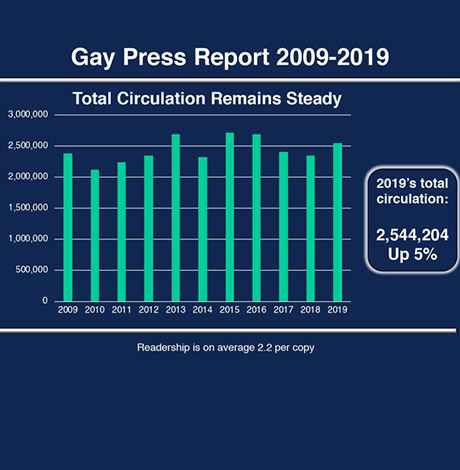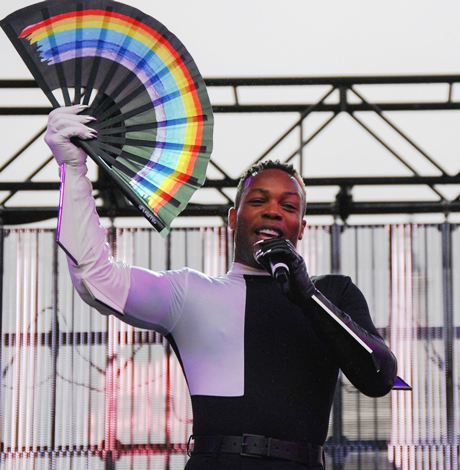Television
MTV ‘True Life Crime’ host reinvents genre
Dometi Pongo puts focus on victims of anti-LGBTQ violence
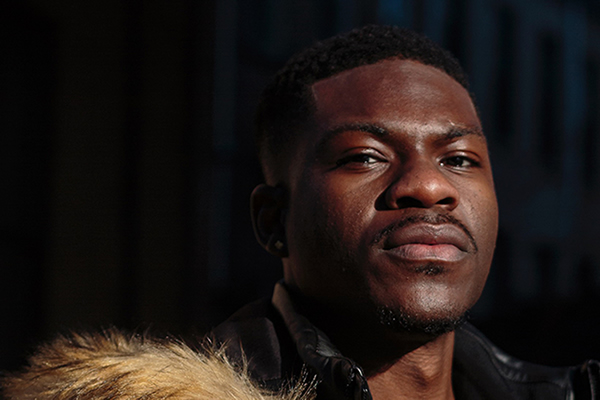
The last place most of us would expect to find a true crime show is on MTV. Yet that’s exactly where you’ll find “True Life Crime” and its host Dometi Pongo, who on Aug. 24 will take a journalistic deep dive into the Mississippi murder of trans teen Mercedes Williamson – just one of the brutal, tragic stories covered by the show since its debut in 2020.
They are the kinds of stories, of course, that make fans of the genre eagerly stay up late to binge watch old episodes of “Cold Case Files” or the latest Netflix serial murderer doc. But while those shows content themselves with being a guilty pleasure for their viewers, this one aims a little higher.
To begin with, it primarily covers violence against people from marginalized communities; and though it examines facts and evidence, those take a back seat to discussion of the social issues around the crimes. Instead of placing all the emphasis on the “how” and “who,” the show puts it on the “why,” taking the spotlight from the killer and shining it on the victim instead – a far cry from the kind of truncated treatment usually bestowed by mainstream news sources when covering crimes against marginalized people.
Pongo – a charismatic host whose passion for amplifying the stories of marginalized communities is tied to his roots in Chicago’s south side – spoke to the Blade about the intentions behind the show, and the need to include the stories of LGBTQ victims.
BLADE: Besides the upcoming episode about Mercedes, this season has already covered two other cases involving anti-LGBTQ violence: the murders of Britney Cosby and Crystal Jackson, who were a lesbian couple, and Muhlaysia Booker, a trans woman of color. Did you come into the show wanting to bring visibility to these kinds of cases?
DOMETI PONGO: It’s my connection to marginalized communities that made me want to do it, to talk about other marginalized communities that I’m not even a part of, but which deserve a voice as well. I’ll be honest with you, at a high level I understood the dangers of homophobia and transphobia in our communities, but I didn’t know the numbers. I didn’t know how often victims were dead-named, how under-reported anti-trans violence goes. I didn’t realize how deep this really got, until I was in the thick of it, reporting on these issues.
The first season we did the story of Kedarie Johnson, who was a gender-fluid teen that was killed in Iowa. That story really helped to open my eyes, and so for this season we wanted to double down.
BLADE: The show differs from other crime shows because it’s more concerned with exploring motives and issues around the cases than it is about the facts. Is that a conscious choice?
PONGO: There’s a conscious idea of either answering questions that the family never had answered, or looking at elements of the person’s identity, or the world around the crime, and figure out how we can tell a fuller story. You know, in some states they can secure a murder conviction without proving motive, so you can have a family go through the entire litigation process, all the way up to the killer being convicted, and they’ll never know why their loved one was killed. The pain that comes from that is gut-wrenching. So, aside from just taking you through the crime and how the person is caught, what can we add to the conversation that can give some solace to the families?
BLADE: As a host, you bring a lot to the show. You’re great on camera and your passion really shines through – but you always deflect the attention toward the family and the community around the victim.
PONGO: Thank you, I appreciate you noticing that. I’m the lens through which the subject gets to tell their story. If I share something about losses and experiences that I have, it’s because I know that human-to-human connection will help the subject open up. As journalists, we’re told never to become the story – and now we’re in this age where you have to have a social media presence, you have to have some charisma about you, you have to be a host of sorts. But I want to make sure that I’m a human first when I’m talking to these families, and I’m glad if that shines through.
BLADE: It does, and so does the fact that your show doesn’t sensationalize the way others do. There’s nothing tabloid about it.
PONGO: We do want to differentiate ourselves. Why would you come to MTV for a true crime story rather than other networks that have been doing them for years? We’ve got to put our bent on it. We’re focused on talking to young folks who live in the pop culture space, and the “True Life” franchise is the perfect avenue for that, because it’s all about the true lives of the subjects, and we wanted to be sure that that was highlighted.
BLADE: The focus on social justice issues certainly gives the show a youthful perspective.
PONGO: They say the young have the energy, and the elders have the wisdom, and we want to arm the energy of these young people – these bright, action-oriented young people who mobilized with the racial reckoning of 2020, who are leading the charge – we want to arm them with context and information about more stories, and how everything in our society kind of folds into what happens. Many of our episodes end with a call to action. Who do you call to change this law? Who do you email? As effective a tool social media is, so is voting, so is emailing legislators, so is getting involved in advocacy groups. We arm our audience with the information that they need to keep doing the great work they’re doing.
BLADE: It’s really activism taking the form of entertainment.
PONGO: That’s it, 100 percent. I started out at a Black-owned radio station on the South Side of Chicago. Al Sharpton held the afternoon slot for his show, each host was very community oriented, so I cut my teeth at that intersection of information and social justice – but I’m also a fan of hip-hop, I’m a fan of music, so when I’m not doing “True Life Crime” I’m doing MTV News interviews with my favorite artists. Investigating that intersection of social justice and pop culture is where I think a lot of our power lies. I think that’s where the young people are sitting right now.
BLADE: What do you hope they take away from these stories?
PONGO: If there’s anything that I want people to take away it’s this: After the show, whatever social justice issue we talk about, research it. Dig into it. That guilty pleasure feels a little bit less guilty if you do the work after that TV cuts off.
“True Life Crime” airs on MTV at 9 p.m. on Tuesdays. All past episodes are available to watch on the MTV website.
Television
Netflix’s ‘The Boyfriend’ is more than a dating show
Cast talks about series’ importance to LGBTQ audiences around the world

It’s unfortunate how poorly so many people view reality television.
Of course, the genre doesn’t always do itself any favors; for decades, the most prominent examples of this medium were drunken fights and jaw-dropping bigotry. But viewers forget that reality TV has evolved along with its eternally growing audience. It still contains wild drama, yes, but recent years have seen an increase in shows like “RuPaul’s Drag Race” and “We’re Here,” which offer nuanced insight into the experiences of queer communities today. Series like these have an undeniable impact on the many who watch them, with their episodes among the most reliable sources of authentic representation that queer viewers can count on. That’s why reality television as a whole deserves more respect, and that’s why Netflix’s “The Boyfriend” is one of the most impactful programs airing today. The show has become a hit, with season 2 now streaming.
Japan’s first gay dating show, this series brings together a group of eligible men for one summer in ‘The Green Room,’ a house where they’ll live, run a small business, and hopefully find their true love. Overseen by a panel of commentators — a common practice for Japanese reality TV — the series has astounded for two seasons with the genuine emotions on display. Yet along with the romance, what sets “The Boyfriend” apart is just how informative it is. Not only by offering insight into a queer culture outside of America, but by creating a level of representation that Japan as a country has never seen before. So many scenes and stories on the show are important for LGBTQ audiences across the globe, but what truly sets “The Boyfriend” apart is the simple message that grounds this entire series: it’s not wrong to be gay.
“In Japan, LGBTQ+ people … [they] are prohibited,” said Durian, a commentator from “The Boyfriend” and one of Japan’s biggest drag performers. “They are regarded as nonexistent …[and] for some of the young people, when it comes to the fact that they are being ignored in society, it could lead to them not having pride in themselves.”
It was a sentiment echoed by “The Boyfriend” cast, with the group describing how LGBTQ identity is rarely discussed in public and only shown through stereotypes. “When I was in middle school, the word gay didn’t exist,” described Huwei, a contestant and member of Thailand’s national judo team. “People would use other words, [ones that] usually mean just being [like] women.” This is reflected in the portrayal of gay people in Japanese media, with the cast detailing how the few times they saw gay characters, it was always hyper-effeminate, ultra cheerful men — traits that were used as joke fodder for the audience. “They’re trying to be [funny], and they’re trying to make people laugh, but it didn’t necessarily have a positive impression,” said Tomoaki, whose time on the show saw the man grapple with accepting his own sexuality.
These topics come up naturally on the program, as well as other facets of what it means to live as a queer person in Japan, granting American audiences vital insight into an LGBTQ culture outside of their own. Durian explained their customs further, saying, “Japan is a bit reserved and very quiet. People may be a little frustrated because they think [the cast] should be more direct, but [their behavior] is really a part of Japanese culture. And if viewers can [understand] that, they’ll be happy.”
It can be easy to forget that the fight for LGBTQ liberation looks different in areas across the world. The cast of “The Boyfriend” not only portrays what dating looks like in their country, but also the many ways their communities fight for acceptance that international audiences don’t often get to see. It doesn’t do this in a way that discredits or villainizes Japanese culture — in fact, many of the men profess how much they love the country that raised them. But their national pride is paired with a hope that their country can grow and begin granting LGBTQ people the respect they deserve. It’s this desire that drives so much of the series’ emotion, making it all the more heartwarming when viewers realize just how important “The Boyfriend” is to this ongoing hope today.
“For me, I’d never been a part of a gay community … this is really [the first] time I was able to be really true to myself,” said Ryuki, a college student and the youngest member of the group. Bomi, who spent a majority of the season pining after fellow contestant Huwei, agreed, saying, “When I came to the ‘Green Room,’ honestly, in the beginning, I was scared … for the last 20 years, I have not really been honest to myself. But through the life I had [on this show], I’ve been able to be truly myself.”
The franchise’s inherent inclusivity not only allowed the men to find romance but to simply find community amongst one another. This led not only to great television but also to the entire cast raving about their time on the show, while also recognizing how hard it is to find this sense of belonging for so many LGBTQ people in Japan today.
As the conversation wound down, the men reflected on what their inclusion on this series means for their country going forward. As members of Japan’s inaugural gay dating show, they’ll be providing examples of queer identity outside of the grinning caricatures that have always permeated popular culture. They would finally be giving so many young LGBTQ viewers the knowledge that there are real people like them out there living happy lives today. This realization drove many of the cast to tears, with each expressing how they hoped these episodes would help those viewers desperately searching for representation. And while they all expressed their care, Bomi summarized the group’s thoughts on what they hoped people took away from “The Boyfriend” best.
“I want people to feel that they’re not alone. You’re not alone. I want to tell [them] that we all have the same kind of issues, and there are a lot of people who haven’t really expressed themselves yet … but we are here. We are here with you.”
An uplifting message of community, one that was only possible because of the genuine bonds this group forged throughout their experience. This shows just how much of an impact “The Boyfriend” is already making on Japanese culture, and it’s a reminder for viewers across the world that none of us are alone in the fight for queer equity today.
“The Boyfriend” season 2 is now streaming on Netflix.
Television
Charles Galin King brings cultural influences, style to ‘King of Drag’
First-ever drag king television competition series airs on Revry
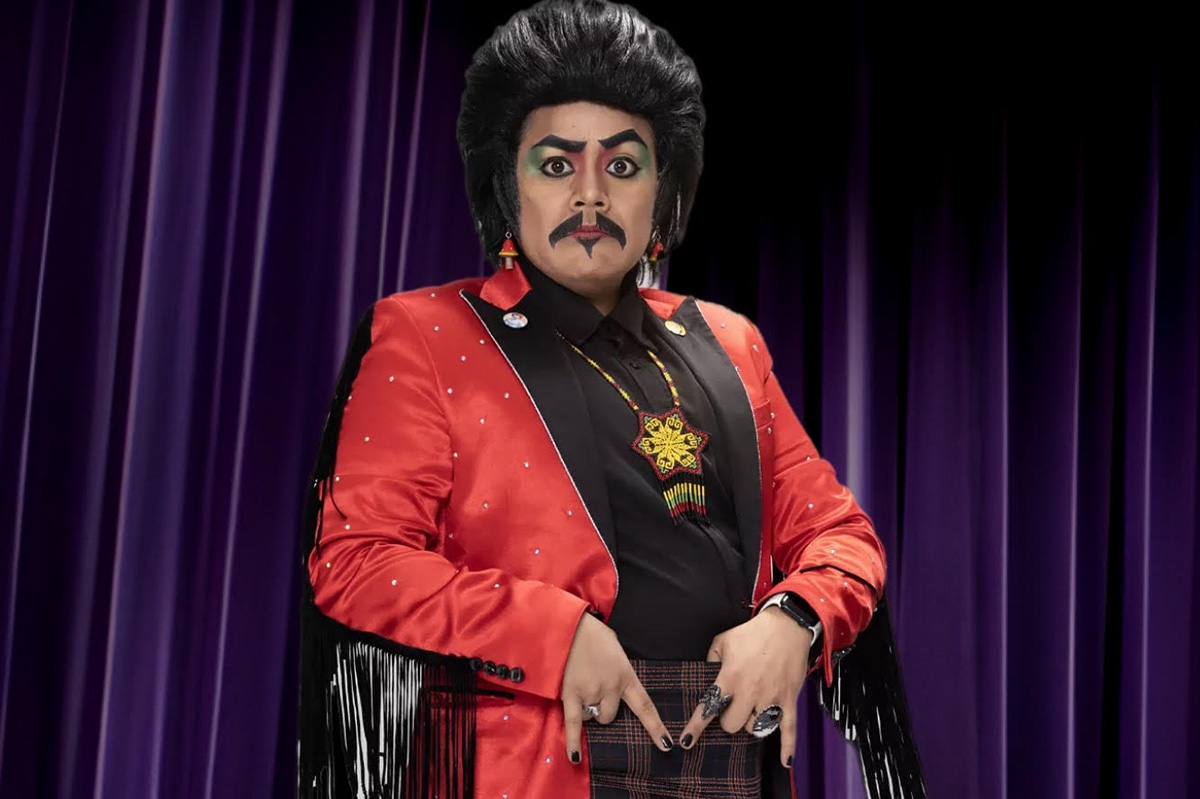
When Charles Galin King made his big debut on the world’s first drag competition show, “King of Drag,” you knew you were taking in a star. He introduced himself as “a Mexican-American Indigenous Wixárika with Ch’ol blood person,” and you couldn’t help but take notice.
His cultural influences are apparent in his drag, serving distinct and memorable looks. He won fans over with his fabulous impression of Nosferatu on “The Dong Show” and connected with them through his honesty about his mental health struggles. After bringing the black plague to the prom, his time on the Revry series came to an end.
We caught up with Charles Galin King to talk about his experience on “King of Drag,” what he hopes to see in future seasons, and advice for new drag kings.
Tell us about your first time in drag.
Back in high school senior year, I decided to wear one of my dad’s black button-up short-sleeved shirts and made a beard and mustache on my face, and wore a fedora hat. I went out with one of my best friends to this day, Ruben, and we went to Hollywood and went to Jack and the Box. I needed the restroom and went to the women’s, and a guy coming out of the men’s said, “Not that one, this one.” And I felt validated in drag cause I was that convincing of a “man,” jajaaaja.
What made you decide to be a part of the inaugural season of ‘King of Drag’?
I wanted to try it cause I was looking at the application out of curiosity, and upon reading started feeling fear and nervousness. And said, “I should apply,” to my mother. Also, l will die one day, might as well go for it and see how it is. I knew I would be a part of the first trial and error cause it’s a first of its kind, so we all learned together what this show is and will be.
What do you hope to see differently in future seasons?
More kings on the King’s Court, and more BIPOC judges, and more lip sync songs.
What surprised you most about your experience on ‘King of Drag’?
I gained nine new siblings and felt a beautiful connection to myself in wanting to be a part of this community even more because of them. And due to being a beautifully diverse experience.
What do you cherish most about your filming experience?
I showed what drag means to me and what my drag is. And being able to say thank you to the cast, crew, tech, and owners of the studio where filming was at.
If you could do one thing over on ‘King of Drag,’ knowing what you know now, what would it be?
Have more money and be able to show my true fear of cutting out a fetus from me and showing myself dying.
Have you had any especially memorable fan interactions since the show began?
Yes, when people and fans would say thank you for sharing your story about accepting death and suicide. And them asking me what surprised me most about being on the show.
Do you hear from other kings about the representation the show offers?
Yes, very much. They feel seen and have been wanting this for such a long time, and it’s a breath of fresh air seeing us all work together. We still feel the hate from those who don’t understand our existence, though I have learned from my kings on the show that with every hate comment, there are ten love comments from the fans.
What do you want aspiring kings to know about the working life of a king?
Be prepared to be looked at by certain audiences with stares of confusion, and being on their phone when performing or being compared to other kings. Also, since we are still climbing to be accepted in this world, the majority of “Drag Race” fans still see us as non-existent and trash. Always focus on our drag king audience, for they understand us the most. Always have fun, for if I have fun, then the audience will have fun alongside me. SO many queens support us, and there are still queens who look down on us. Accept that and focus on your music, routines, lyrics, and feeling the vibes of what character you will put on stage.
If you can ask a co-star or Murray Hill one question at a season 1 reunion, what would it be?
What’s your favorite flavor of ice cream if you eat ice cream? And when can we hang out and look out to the sunset and high-five when it’s time to go home?
Stream the entire season of “King of Drag” now on Revry.com and follow Charles Galin King on social.
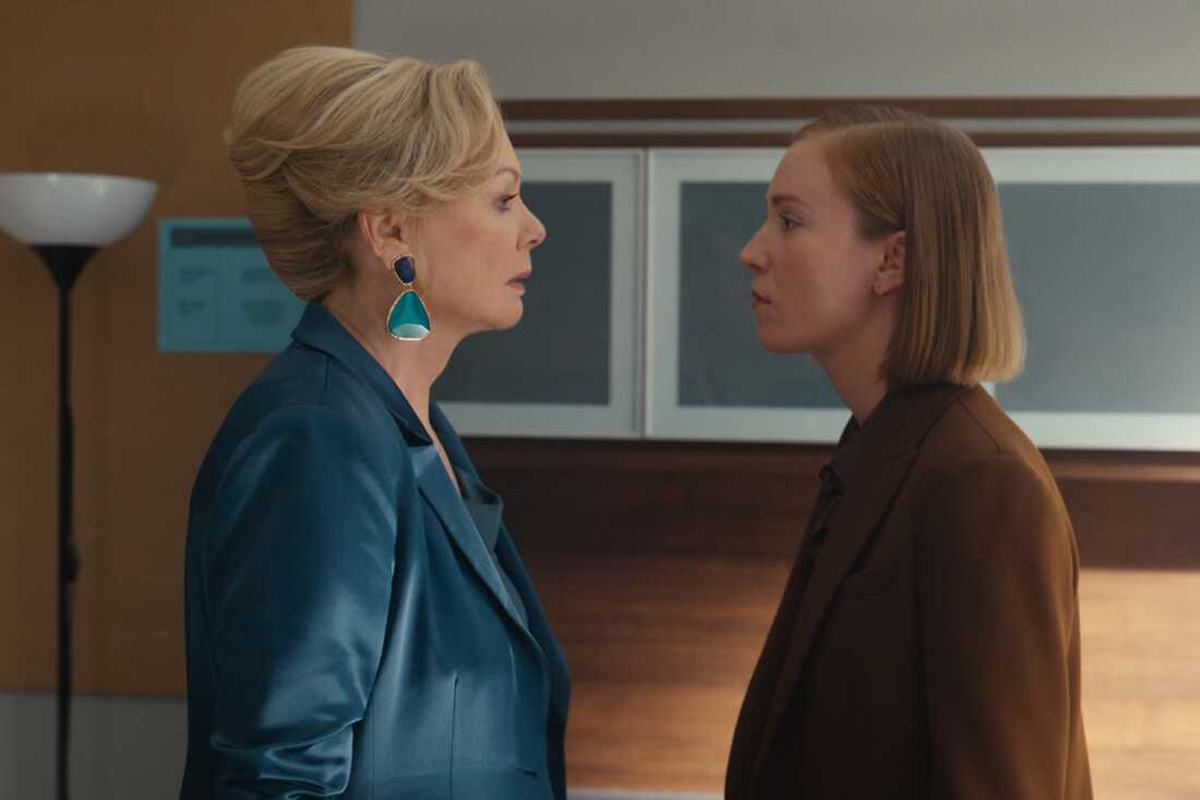
Sure, we know everybody’s talking about the Emmy nominations right now, but they aren’t the only TV awards in town.
On July 8, GALECA: The Society of LGBTQ Entertainment Critics announced the winners of its 17th Dorian TV Awards.
With more than 560 critics, journalists, and media icons making up its membership, GALECA is the second largest entertainment journalists’ group in the world, and they present their Dorian Awards – named in honor of Oscar Wilde, the celebrated queer writer who penned “The Picture of Dorian Gray” and who serves as something like the group’s patron saint – to honor the best in film, television, and theater at separate times during each year. Frequently, many Dorian nominees and winners presage similar honors from the more mainstream awards bodies, reminding the world that the informed LGBTQ perspective on all things entertainment definitely matters; at the same time, however, the Dorians also include several queer-centric categories that are unique to them, providing an opportunity to amplify the reach of more unsung and off-the-radar material which might otherwise be overlooked.
For this year’s TV awards – which, as always, honor both mainstream and queer-focused content across broadcast, cable, and streaming platforms – streaming giant Max scored big. Their new, genre-expanding hit “The Pitt” was awarded Best TV Drama, with veteran star Noah Wyle earning Best Leading TV Performance (Drama) for his role on the show. A parallel double victory was bestowed in the comedy categories, where Max triumphed once more with “Hacks” winning both Best TV Comedy and Best Lead Performance (Comedy) for star Jean Smart (both winning for the third year in a row), and her co-star, Hannah Einbinder, took the Best Supporting TV Performance (Comedy) win for a second time. “Hacks” also scored wins as Best LGBTQ TV Show and Best-Written TV Show (Comedy).
Smart also added an additional accolade to her ever-growing tally, winning GALECA’s TV Icon Award, an annual career achievement honor previously bestowed on the likes of Jennifer Coolidge, Christine Baranski and Carol Burnett. Other special accolades: nonbinary multi-hyphenate Cole Escola (creator-star of the outlandish Broadway smash “Oh, Mary!”) earned GALECA’s “Wilde Wit” Award, following in the footsteps of such past winners as Julio Torres, Wanda Sykes, Bowen Yang and John Oliver; and Ncuti Gatwa – the Rwandan-born Scottish actor who is the first Black and out queer performer to portray the title character in BBC’s long-running sci-fi hit “Doctor Who” – was named as LGBTQIA+ TV Trailblazer.
Other noteworthy wins: “Andor,” the boldly queer-inclusive (and anti-fascist) Disney Plus “Star Wars” spin-off about the rise of the galactic resistance against an authoritarian empire, was named as Best Genre TV Show; “Overcompensating,” the sexy-but-sweet collegiate comedy from viral internet star Benito Skinner and Amazon Prime Video, took the prize for Best Unsung TV Show; Peacock’s Alan Cumming-hosted “The Traitors” won double honors as both Best Reality Show and “Campiest” TV Show (the Dorians’ cheekiest prize); the HBO two-parter “Pee-wee as Himself” defeated all competitors to win as both Best TV Documentary and Best LGBTQ TV Documentary; and “Wicked” fans will be glad to hear that the movie’s stars Ariana Grande and Cynthia Erivo (the group’s LGBTQIA+ Film Trailblazer honoree earlier this year) came in on top of the TV Musical Performance category, beating out a highly competitive field that included Beyoncé and Kendrick Lamar, to win with a medley of tunes from “The Wizard of Oz” and its various descendents on ABC’s broadcast of the 97th Academy Awards.
“This year’s Dorian TV winners prove once again that queer folks have an especially keen eye for stellar TV, using our culture’s lens to elevate the bold, brilliant, and blissfully bonkers,” said Diane Anderson-Minshall, GALECA’s Executive Director. “From Hacks’ dazzling domination to Ncuti Gatwa’s historic trailblazing, we’re proud to celebrate a wildly entertaining spectrum of talent and storytelling.”
Added GALECA’s President, Walt Hickey, “The Dorian Awards this year illustrate more than anything the depth and quality of TV right now, especially when it comes to shows by and for LGBTQ+ people. This year’s crop of winners made us laugh, inspired us, and delivered some of the most intense and rewarding performances many of our members have ever seen.”
GALECA: The Society of LGBTQ Entertainment Critics and its Dorian Awards honor the best in film, television, and theater at separate times of the year. With over 560 members, GALECA. A nonprofit organization, GALECA also advocates for better pay, access, and respect for entertainment journalists (especially those most underrepresented), providing scholarships for LGBTQ journalism students and more.
2025 DORIAN TV AWARD WINNERS, FULL LIST
BEST TV DRAMA
Andor (Disney+)
The Last of Us (HBO)
The Pitt (Max)
Severance (Apple TV+)
The White Lotus (HBO)
BEST TV COMEDY
Abbott Elementary (ABC)
Hacks (Max)
The Rehearsal (HBO)
Somebody Somewhere (HBO)
The Studio (Apple TV+)
BEST LGBTQ TV SHOW
Agatha All Along (Disney+)
Hacks (Max)
Heartstopper (Netflix)
Overcompensating (Amazon Prime Video)
Somebody Somewhere (HBO)
Rebel Ridge (Netflix)
BEST WRITTEN TV SHOW
Andor (Disney+)
Hacks (Max)
The Pitt (Max)
Severance (Apple TV+)
The White Lotus (HBO)
BEST UNSUNG TV SHOW
English Teacher (FX on Hulu)
Evil (Paramount+)
Fantasmas (HBO)
Mid-Century Modern (Hulu)
Overcompensating (Amazon Prime Video)
BEST NON-ENGLISH LANGUAGE TV SHOW
Elite (Netflix)
My Brilliant Friend (HBO)
One Hundred Years of Solitude (Netflix)
Pachinko (Apple TV+)
Squid Game (Netflix)
Threesome (ViaPlay)
BEST LGBTQ NON-ENGLISH LANGUAGE TV SHOW
Becoming Karl Lagerfeld (Hulu)
The Boyfriend (Netflix)
Elite (Netflix)
The Secret of the River (Netflix)
Threesome (Viaplay)
When No One Sees Us (Max)
BEST TV PERFORMANCE – DRAMA
Colin Farrell, The Penguin (HBO)
Stephen Graham, Adolescence (Netflix)
Cooper Koch, Monsters: The Lyle and Erik Menendez Story (Netflix)
Diego Luna, Andor (Disney+)
Cristin Milioti, The Penguin (HBO)
Pedro Pascal, The Last of Us (HBO)
Bella Ramsey, The Last of Us (HBO)
Adam Scott, Severance (Apple TV+)
Michelle Williams, Dying for Sex (FX on Hulu)
Noah Wyle, The Pitt (Max)
BEST SUPPORTING TV PERFORMANCE—DRAMA
Carrie Coon, The White Lotus (HBO)
Owen Cooper, Adolescence (Netflix)
Taylor Dearden, The Pitt (Max)
Erin Doherty, Adolescence (Netflix)
Walton Goggins, The White Lotus (HBO)
Katherine LaNasa, The Pitt (Max)
Genevieve O’Reilly, Andor (Disney+)
Parker Posey, The White Lotus (HBO)
Jenny Slate, Dying for Sex (FX on Hulu)
Tramell Tillman, Severance (Apple TV+)
BEST TV PERFORMANCE—COMEDY
Uzo Aduba, The Residence (Netflix)
Quinta Brunson, Abbott Elementary (ABC)
Ayo Edebiri, The Bear (FX on Hulu)
Bridget Everett, Somebody Somewhere (HBO)
Nathan Fielder, The Rehearsal (HBO)
Kathryn Hahn, Agatha All Along (Disney+)
Natasha Lyonne, Poker Face (Peacock)
Seth Rogen, The Studio (Apple TV+)
Benito Skinner, Overcompensating (Amazon Prime Video)
Jean Smart, Hacks (Max)
BEST SUPPORTING TV PERFORMANCE—COMEDY
Ike Barinholtz, The Studio (Apple TV+)
Colman Domingo, The Four Seasons (Netflix)
Hannah Einbinder, Hacks (Max)
Kathryn Hahn, The Studio (Apple TV+)
Jeff Hiller, Somebody Somewhere (HBO)
Holmes, Overcompensating (Amazon Prime Video)
Janelle James, Abbott Elementary (ABC)
Linda Lavin, Mid-Century Modern (Hulu)
Catherine O’Hara, The Studio (Apple TV+)
Meg Stalter, Hacks (Max)
BEST TV MUSICAL PERFORMANCE
Beyoncé, “Cowboy Carter” medley, Beyoncé Bowl (Ravens vs. Texans Halftime Show) (Netflix)
Doechii, “Catfish” / “Denial Is a River,” 67th Annual Grammy Awards (CBS)
Cynthia Erivo, Ariana Grande, “Oz Medley” (“The Wizard of Oz,” “The Wiz,” “Wicked”), 97th Academy Awards (ABC)
Kathryn Hahn, Patti LuPone, Ali Ahn, Sasheer Zamata, “The Ballad of the Witches’ Road,” Agatha All Along (Disney+)
Kendrick Lamar, “Squabble Up,” “Humble,” etc., Super Bowl LIX Halftime Show (Fox)
BEST TV DOCUMENTARY OR DOCUMENTARY SERIES
Deaf President Now! (Apple TV+)
Elizabeth Taylor: The Lost Tapes (Max)
Pee-wee as Himself (HBO)
The Rehearsal (HBO)
SNL50: Beyond Saturday Night (Peacock)
BEST LGBTQ TV DOCUMENTARY OR DOCUMENTARY SERIES
Disco: Soundtrack of a Revolution (PBS)
Fanatical: The Catfishing of Tegan and Sara (Hulu)
Outstanding: A Comedy Revolution (Netflix)
Pee-wee as Himself (HBO)
Queer Planet (Peacock)
BEST CURRENT AFFAIRS SHOW
The Daily Show (Comedy Central)
Everybody’s Live with John Mulaney (Netflix)
Hot Ones (YouTube)
Late Night with Seth Meyers (NBC)
Last Week Tonight with John Oliver (HBO)
BEST GENRE TV SHOW
Agatha All Along (Disney+)
Andor (Disney+)
Black Mirror (Netflix)
The Last of Us (HBO)
Severance (Apple TV+)
BEST ANIMATED SHOW
Big Mouth (Netflix)
Bob’s Burgers (Fox)
Harley Quinn (Max)
The Simpsons (Fox)
Star Trek: Lower Decks (Paramount+)
MOST VISUALLY STRIKING TV SHOW
Adolescence (Netflix)
Agatha All Along (Disney+)
Andor (Disney+)
Severance (Apple TV+)
The White Lotus (HBO)
BEST REALITY SHOW
The Amazing Race (CBS)
The Great British Baking Show (Netflix)
RuPaul’s Drag Race (MTV)
Top Chef (Bravo)
The Traitors (Peacock)
CAMPIEST TV SHOW
Doctor Odyssey (ABC)
Mid-Century Modern (Hulu)
Overcompensating (Amazon Prime)
RuPaul’s Drag Race (MTV)
The Traitors (Peacock)
WILDE WIT AWARD
Quinta Brunson
Alan Cumming
Hannah Einbinder
Cole Escola
Nathan Fielder
GALECA TV ICON AWARD
Gillian Anderson
Angela Bassett
Alan Cumming
Sarah Michelle Gellar
Jean Smart
GALECA LGBTQIA+ TV TRAILBLAZER AWARD
Jonathan Bailey
Greg Berlanti
Ncuti Gatwa
Bella Ramsey
Mike White



